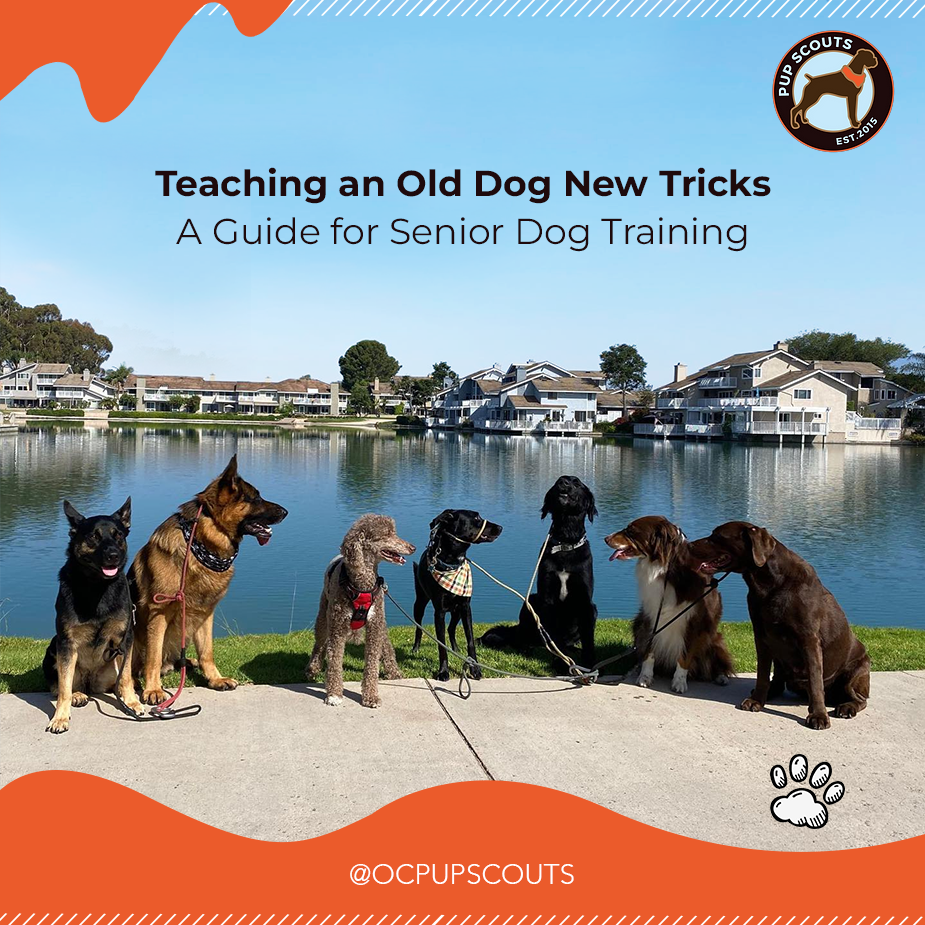Teaching an Old Dog New Tricks: A Guide for Senior Dog Training

It’s never too late to engage your dog’s mind, boost its confidence & strengthen your bond with adequate dog training.
They say you can’t teach an old dog new tricks, but that couldn’t be further from the truth. Dogs, regardless of their age, can learn new things and adapt to changes in their environment.
Whether you’ve just adopted a senior dog or your faithful companion has been by your side for years, it’s never too late to engage their minds, boost their confidence, and strengthen your bond.
Training older dogs can be an incredibly rewarding experience. In this guide, we’ll explore the joys and challenges of training senior dogs, offering tips and tricks to make the process enjoyable for you and your furry friend.
Why Is Dog Training Important for a Senior Dog?
You might wonder why you should bother training an older dog. After all, isn’t he set in his ways?
The truth is senior dogs can benefit immensely from ongoing training for several reasons:
1. Mental Stimulation
Just like humans, senior dogs benefit from mental stimulation. Training sessions provide a mental workout that helps keep their brains sharp and engaged.
It can be particularly important as dogs age and may experience cognitive decline.
2. Improved Behavior
Training is not just about teaching tricks; it’s also about instilling good behavior. Many older dogs may have developed undesirable habits, such as excessive barking or pulling on the leash.
Proper training can help address these issues and make life with your senior dog more enjoyable.
3. Strengthening the Bond
Training is an amazing way to strengthen the bond between you and your senior dog. Spending quality time together during training sessions builds trust and communication, enhancing your relationship.
4. Enhanced Safety
Training can be a matter of safety for senior dogs. Teaching commands like “stay” and “come” can help keep your older dog safe in various situations, such as avoiding traffic or staying out of harm’s way.
Effective Dog Training Techniques for Senior Dogs
Training a senior dog requires patience, understanding, and some adjustments to your approach. Here are some essential tips to make the process smoother:
1. Start with Basic Commands
Begin with commands your dog already knows. It builds their confidence and sets a positive tone for training. Gradually introduce new commands as they become more comfortable.
2. Be Patient
Patience is key when training senior dogs. They may not pick up on commands as quickly as younger pups, so be prepared for slower progress. Celebrate small victories and remain consistent in your training efforts.
3. Use Positive Reinforcement
Positive reinforcement, such as praise, treats, and petting, is a highly effective training method for senior dogs. Reward them when they show the desired behavior to encourage repetition.
4. Keep Sessions Short and Frequent
Older dogs may tire more quickly, so it’s important to keep training sessions short and frequent. Aim for multiple short sessions throughout the day rather than one long session.
5. Adapt to Their Physical Limitations
Senior dogs may have physical limitations due to age-related issues like arthritis. Be mindful of these limitations and adjust your training accordingly. Choose low-impact exercises and movements that won’t strain their bodies.
6. Consistency is Key
Consistency is crucial in training senior dogs. Use consistent commands, reward systems, and routines to help them understand what is expected of them.
OC Pup Scouts: Tailored Senior Dog Training Services in Orange County
When training your senior dog, you want a professional who understands the unique needs of older dogs. That’s where OC Pup Scouts comes in. We specialize in dog training and offer personalized programs tailored to your dog’s requirements.
Our experienced trainers are well-versed in working with senior dogs and can help with various issues, from basic obedience to behavior modification.
We take a gentle and patient approach to training, ensuring your senior dog feels comfortable and safe throughout the process.
Don’t hesitate to reach out to us and embark on this exciting journey of senior dog training today!

We offer personalized programs tailored to your dog’s specific requirements.
Frequently Asked Questions
1. How can training benefit my senior dog’s overall well-being?
Training provides essential mental stimulation that sharpens your senior dog’s cognitive abilities and helps prevent cognitive decline. These sessions offer opportunities for social interaction with other dogs and people, crucial for maintaining their well-adjusted and happy disposition.
The confidence they gain through training can increase self-assuredness and a deeper bond between you and your furry friend.
2. My senior dog has physical limitations. Can they still be trained?
It’s essential to consider your senior dog’s physical condition when designing a training program. A wise choice is to consult a veterinarian and an experienced professional dog trainer.
They can help you tailor a training regimen that accommodates your dog’s specific needs and limitations, ensuring they can participate safely and comfortably.
3. Is positive reinforcement the best approach for older dogs?
Older dogs tend to be typically more sensitive to corrections or negative feedback. Using rewards like treats, praise, and affection for good behavior motivates them and strengthens their trust and confidence in you.
It creates a positive learning environment, encouraging them to engage and participate willingly.
4. How long should training sessions be for senior dogs?
Senior dogs generally have shorter attention spans and lower energy levels than their younger counterparts.
It’s advisable to keep training sessions short, typically 10 to 15 minutes, to accommodate this. Frequent, shorter sessions are more effective and less exhausting for your senior dog than long, intensive training marathons.
5. Can training help with behavior problems in older dogs?
Training can be a game-changer when addressing and modifying behavior problems in senior dogs. Professional trainers have the expertise to provide specialized solutions, whether it’s excessive barking, anxiety, aggression, or other unwanted behaviors.
They can assess the root causes of these issues and develop strategies to effectively manage or eliminate them, greatly improving your dog’s quality of life.
More to read in OC Pup Scouts Blog
The Benefits of Regular Dog Walking for Your Pet’s Health
5 Essential Things to Check Before Hiring a Dog Walker in Orange County

Teaching an Old Dog New Tricks: A Guide for Senior Dog Training
continue reading
They say you can’t teach an old dog new tricks, but that couldn’t be further from the truth. Dogs, regardless of their age, can learn new things and adapt to changes in their environment. Whether you’ve just adopted a senior dog or your faithful companion has been by your side for years, it’s never too […]

